A power-packed Apex Committee meeting of the new Science, Technology & Innovation Policy STIP 2020 discussed various suggestions for the upcoming policy that will pave the way towards a knowledge-based economy.
The meeting on virtual mode chaired by Professor K Vijay Raghavan, Principal Scientific Adviser to the Government of India, and co-chaired by Dr. V K Saraswat, Member Science, NITI Aayog and Professor Ashutosh Sharma, Secretary, Department of Science and Technology, Government of India, was held on November 26, 2020.
The draft STIP2020 policy was presented in the meeting. The distinguished thought leaders deliberated upon some big ideas and suggestions to be incorporated in the draft policy.
STIP 2020, India’s fifth National Policy for Science, Technology, and Innovation, aims to capture the aspirations of the entire nation through a decentralized, bottom-up, and inclusive approach. From open science to funding priorities; critical human capital to equity and inclusion; strategic technologies to traditional knowledge systems; science diplomacy to science communication – this policy promises a renewed STI ecosystem for an Atmanirbhar Bharat.
The STIP 2020 Secretariat has been established jointly by the Office of Principal Scientific Adviser (PSA) and the Department of Science and Technology (DST) to coordinate and execute the entire STIP 2020 policy-making process.
Secretaries of all science and several line ministries -- Secretary, Ministry of Earth Sciences; Dr. M Rajeevan, Secretary, Department of Atomic Energy (DAE) Shri K. N. Vyas; Director-General Council for Scientific & Industrial Research (CSIR) Dr. Shekhar Mande; Secretary, Department of Biotechnology (DBT) Dr. Renu Swarup; Secretary, Department of Space, Dr. K. Sivan; Secretary, Science, and Engineering Research Board (SERB) Prof. Sandeep Verma; Secretary, Ministry of AYUSH, Shri Vaidya Rajesh and Scientific Secretary, O/o Principal Scientific Adviser to GoI Dr. Arabinda Mitra participated and shared their insights and expectationsfrom the STIP 2020.
Heads of several national-level S&T institutions like Prof. Govindan Rangarajan, Director, IISc Bangalore; Prof. Subhasis Chaudhuri, Director, IIT Bombay; Prof. Bhaskar Ramamurthi, Director, IIT Madras; Prof. V Ramgopal Rao, Director, IIT Delhi; Prof. Jagdesh Kumar, VC, JNU; Prof. Umapathy, Director, IISER Bhopal; Dr. Sudhir K. Jain, Director, IIT Gandhinagar; Prof. T. G. Sitharam, Director, IIT Guwahati; Dr. Chandrima Shaha, President, INSA; Dr. Shailesh Nayak, Director, National Institute of Advanced Studies, Bangalore; Dr. Suresh, President, ISBA and from industry associations CEO, Invest India, Shri Deepak Bagla; S Raghupathy, Deputy Director General & In charge of Technology Department, CII & Mr. Dilip Chenoy, Secretary-General, FICCI along with other nominated members from various knowledge organizations provided their inputs to strengthen the new policy.
Dr Akhilesh Gupta, Head, STIP-2020 Secretariat made a presentation on policy formulation process and major recommendations contained in the draft policy document.
Sources https://pib.gov.in/PressReleasePage.aspx?PRID=1676703

Jeevan Pramaan. Digital Life Certificate for Pensioners
Jeevan Pramaan is a biometric enabled digital service for pensioners. Pensioners of Central Government, State Government or any other Government organization can take benefit of this facility.
More than One Crore families in India can be classified as pensioner families, where the pension disbursed by the various government bodies forms the basis for their income and sustainability. There are about Fifty Lakh pensioners of the Central Government and a similar number of the various State and UT Governments and various other government agencies. This includes pensioners from the various public sector enterprises. In addition to this Army and Defence Personnel drawing pension exceeds Twenty-five lakhs.
One of the major requisite for the pensioners post their retirement from service, is to provide life certificates to the authorized pension disbursing agencies like Banks,Post offices etc., following which their pension is credited to their account. In order to get this life certificate the individual drawing the pension is required to either personally present oneself before the Pension Disbursing Agency or have the Life Certificate issued by authority where they have served earlier and have it delivered to the disbursing agency.
This very requirement of personally being present in front of the disbursing agency or getting a life certificate often becomes a major hurdle in the process of seamless transfer of pension amount to the pensioner. It has been noted that it causes a lot of hardship and unnecessary inconvenience particularly for the aged and infirm pensioners who cannot always be in a position to present themselves in front of the particular authority to secure their life certificate. In addition to this a lot of government employees post their retirement choose to move to a different location either to be with their family or other reasons, hence causing a huge logistical issue when it comes to accessing their rightful pension amount.
Digital Life Certificate for Pensioners Scheme of the Government of India known as Jeevan Pramaan seeks to address this very problem by digitizing the whole process of securing the life certificate. It aims to streamline the process of getting this certificate and making it hassle free and much easier for the pensioners. With this initiative the pensioners requirement to physically present himself/herself in front of the disbursing agency or the certification authority will become a thing of the past benefiting the pensioners in a huge way and cutting down on unnecessary logistical hurdles.
How it Works
Jeevan Pramaan uses the Aadhaar platform for biometric authentication of the pensioner.
A successful authentication generates the Digital Life Certificate which gets stored in the Life Certificate Repository. The Pension Disbursing Agencies can access the certificate on-line.
-
-
Life Certificate Generation
Download the PC/ Mobile application or alternatively visit the nearest Jeevan Pramaan Centre to get yourself registered.
Provide necessary information like Aadhaar number, Pension Payment Order,
Bank Account, Bank Name and your Mobile number. -
Aadhaar Authentication
Provide your biometrics, either a finger print or Iris and authenticate your self.
(Jeevan Pramaan uses the Aadhaar Platform for on-line biometric authentication ) -
Life Certificate.
After a successful authentication a SMS acknowledgement is sent to your mobile number including your Jeevan Pramaan Certificate ID.
The certificates are stored in the Life Certificate Repository for making it available any time and any where for the pensioner and the Pension Disbursing Agency. -
Access your Certificate
You can download a PDF copy of the certificate from the Jeevan Pramaan website by providing
the Jeevan Pramaan ID. -
-
Pension Disbursing Agency
The Pension Disbursing Agency can access the Life Certificate from the Jeevan Pramaan website, and download the same.
-
Electronic Delivery
The Life Certificates can also be electronically delivered to the Pension Disbursing Agency, without any manual intervention.
(Pension Disbursing Agency can get in touch with our team, to enable the e-delivery facility ) -
-
Get a Certificate
Getting a digital Life certificate is hassle free and can be obtained through various Jeevan Pramaan Centres which are being operated by CSCs, Banks, Government offices or by using the client application on any PC/mobile/tablet.
Download the PC/Mobile/Tablet application to register for a Life Certificate.
-
PC
Windows 7(or Above) OS 32 & 64 bit.
-
Mobile
Android 4.0 and above
-
Offices
Central & State Government Offices
Visit official website https://jeevanpramaan.gov.in
The Prime Minister Shri Narendra Modi will embark on a 3 city visit to personally review the vaccine development and manufacturing process. He will visit the Zydus Biotech Park in Ahmedabad, Bharat Biotech in Hyderabad and Serum Institute of India in Pune.
As India enters a decisive phase of the fight against COVID-19, The Prime Minister’s visit to these facilities and discussions with the scientists will help him get a first-hand perspective of the preparations, challenges and roadmap in India’s endeavour to vaccinate its citizens.
https://twitter.com/PMOIndia/status/1332263147437051904?ref_src=twsrc%5Etfw%7Ctwcamp%5Etweetembed%7Ctwterm%5E1332263147437051904%7Ctwgr%5E%7Ctwcon%5Es1_&ref_url=https%3A%2F%2Fpib.gov.in%2FPressReleasePage.aspx%3FPRID%3D1676468
Union Education Minister Shri Ramesh Pokhriyal ‘Nishank’ virtually released a compilation of initiatives undertaken by School Education Department during COVID-19 pandemic here today.
The Minister noted that in the year 2020-21, the COVID-19 pandemic has caused an unprecedented public health emergency, affecting almost all countries and territories globally. He further said that the pandemic has led to severe disruptions in normal life,and has impacted children and also affected the closure of schools in the country.
Releasing the compilation,Shri Pokhriyal highlighted that Department of School Education & Literacy has taken several initiatives such as PM e-Vidya, Pragyata Guidelines, Manodarpan for Psycho-social support, E-Content, Alternative Academic Calender, etc to ensure that the school going students don’t lag behind in their studies during COVID-19 pandemic. He expressed his happiness that these initiatives have contributed a lot in mitigating the impact of the pandemic. Ministry has come out with several measures to remodel and re-imagine the way teaching and learning have happened so far. The Minister lauded the efforts of the officials of the Ministry to introduce many new suitable methods of delivering quality education through a healthy mix of schooling at home and schooling at school.
Dr. Harsh Vardhan, Union Minister of Health and Family Welfare today chaired multiple eventsto mark National Organ Donation Day.
Dr. Harsh Vardhan addressed CRPF jawans on an event to mark the culmination of a massive voluntary campaign that was launched by CRPF on 14th August this year to bring awareness about organ donation among its nearly three and a half lakh jawans in collaboration with All India Institute of Medical Sciences (AIIMS) New Delhi and Organ Retrieval Banking Organization (ORBO).
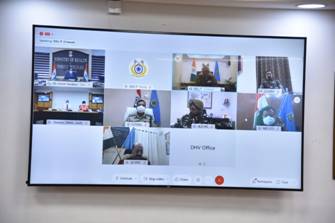
Expressing his elation that the positive message of the drive organized by CRPF will trickle down till the last jawan, he had noted that 79,572 soldiers, who have been conferred by CRPF as 'Angadan warriors', have duly filled their pledge forms to donate their eyes, skin, lungs, heart, liver, pancreas, kidneys, heart valves and intestines after death. “They exemplify the spirit of service to the nation even after death”, he added.
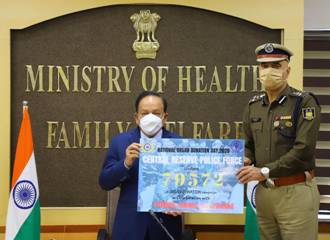
Dr. Harsh Vardhan in this context continued, “In our country, a large number of people die due to non-functioning of organs. According to the National Health Portal, about 5 lakh people die every year due to non-availability of organs. I also want to say here that no age, caste, religion, community, belief should ever come as an obstacle in a task as divine as that of donating organs. If a person below 18 years of age wishes to donate organ, he can do so with the consent of his parents or guardian. The goal of this campaign is to remove the fear of organ donation by spreading awareness through webinars, seminars and workshops and aiming at the root of the problem by granting acceptance to organ donation.”
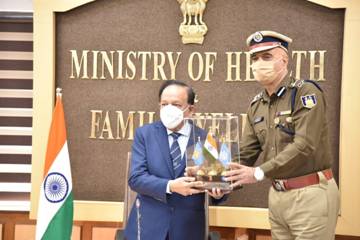
Dr. Harsh Vardhan congratulated the CRPF on their exemplary service in dealing with the problem of terrorism and separatism in Jammu and Kashmir, insurgency in the north-eastern states, the Left-Wing Extremists in Central India and for conducting State and National elections impartially and efficiently.
Dr. A.P. Maheshwari, Director General CRPF, Dr. Randeep Singh Guleria, Director, All India Institute of Medical Sciences (AIIMS) New Delhi, Dr. (Prof.) Aarti Vij, Chief, Organ Retrieval Banking Organization (ORBO) attended the CRPF event through Video Conference. Sh. Bharat Bhushan Vaid, DIG CRPF was also present at the event.
Later in the day, The National Organ & Tissue Transplant Organisation (NOTTO), mandated under the Transplantation of Human Organs (Amendment) Act 2011 to carry out activities for promotion of organ donation from deceased persons, putting systems in place for organ donation and transplantation and training the necessary manpower and personnel celebrated the 11th National Organ Donation Day in the presence of Sh. Ashwini Kumar Choubey, Union Minister of State for Health and Family Welfare.
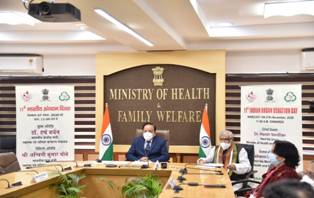
Congratulating NOTTO at national level, the Regional Organ & Tissue Transplant Organisations (ROTTO) at regional level and the State Organ & Tissue Transplant Organisations (SOTTO) at state level for setting up network among hospitals and tissue banks for procurement and sharing of organs obtained from the deceased donors and their timely allocation, Dr. Harsh Vardhan said, “The Ministry of Health and Family Welfare, Government of India has set up 5 ROTTOs in Chandigarh, Kolkata, Mumbai, Chennai and Guwahati to cover North, East, West, South and North-Eastern regions of the country respectively. In addition to these, 12 SOTTOs have been established in the States of Kerala, Rajasthan, Madhya Pradesh, Goa, Jammu and Kashmir, Haryana, Odisha, Gujarat, Uttar Pradesh, Bihar, Punjab and Jharkhand.” He added that the networking of the transplant and retrieval hospitals has been done to a large extent, which has started to ensure that any organ which is donated does not get wasted; every donated organ is a priceless national resource.
Observing that online pledging facility for organ and tissue donation is available via the NOTTO website (www.notto.gov.in) which makes it easier for citizens to pledge, Dr. Harsh Vardhan requested all adult citizens of India to visit the NOTTO website to pledge to donate their organs online as well as follow the Twitter, Facebook and YouTube pages of NOTTO to be a part of this new-age revolution especially in the light of the COVID-19 Pandemic. He also requested potential donors to ensure that their family and friends are onboarded during decision making as the responsibility for organ donation is likely to fall on their shoulders.
Dr. Harsh Vardhan expressing his happiness said, “With 12,666 organs transplanted in 2019, ranked third in the world as per data available on the WHO Global Observatory on Donation and Transplantation (GODT) website. This exemplary performance by states and healthcare professionals in our country should be encouraged at every step so that the curve keeps following an upward trend.” He mentioned that the National Organ Transplant Programme (NOTP) provides financial grants for establishing ROTTOs and SOTTOs, to develop new and upgrade existing retrieval and transplant centres, to set up regional and State biomaterial centres and to provide immunosuppressive therapy to Below Poverty Line (BPL) patients who have undergone organ transplantation in a Government hospital. Further, financial support is also provided for hiring of transplant coordinators by hospitals and for maintenance of brainstem dead donors, when at least one organ is shared with a Government hospital.
Stating the COVID-19 pandemic has had a hugely negative impact on the deceased donor programme in India he said, “National events such as the Indian Organ Donation Day where we recognize the selfless contribution made by deceased donors to healthcare and mankind re-instill our faith in humanity.” As a gesture of gratitude, the Minister read out the names of donors from every State of the country whose death rekindled the lives of others.
Sh. Ashwini Kumar Choubey noted that Upanishads remark that body belongs to the five elements to which it returns upon deathand said, “Associating oneself with one’s mortal body is disillusionment in Hindu scriptures. Everybody should donate their body for a nobler cause like Rishi Dadhichi.” He also exhorted putting in place a National digital portal for better co-ordination in organ retrieval and transplantation and better reporting of related figures.
ROTTO (West) was judged the best ROTTO in the country while the Tamil Nadu SOTTO was awarded the best State SOTTO. Tamil Nadu performed a whooping 295 transplantations out of which 76 were lung transplants performed mostly on patients who suffered acute forms of COVID. PGIMER, Chandigarh was judged the best hospital.
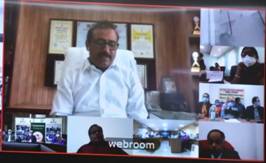
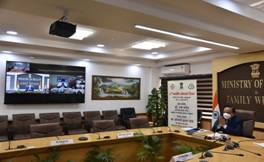
Sh. Rajesh Tope, Health Minister, Maharashtra (on behalf of ROTTO West) and Sh. C. Vijaybaskar, Health Minister, Tamil Nadu expressed elation at the recognition of their work and addressed everybody present.
Many organ recipients narrated their gratefulness exhorting everyone listening to help others in need of organs to come out of the situation of similar helplessness.
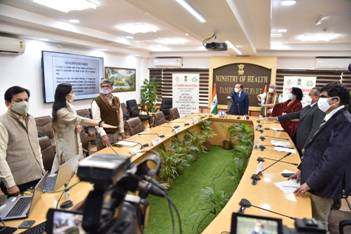
Dr. Harsh Vardhan led everyone in taking the solemn pledge of organ donation at the end of the event.
Union Health Secretary Sh. Rajesh Bhushanwas also present in the second event.

0 Comments